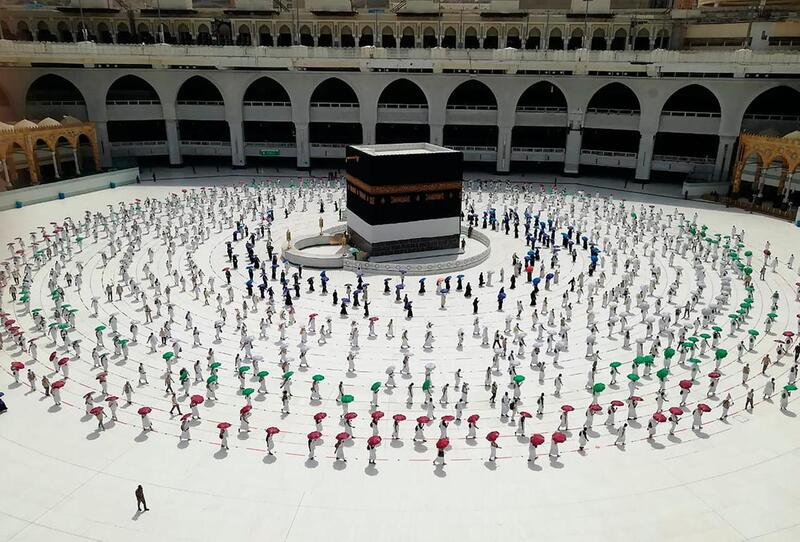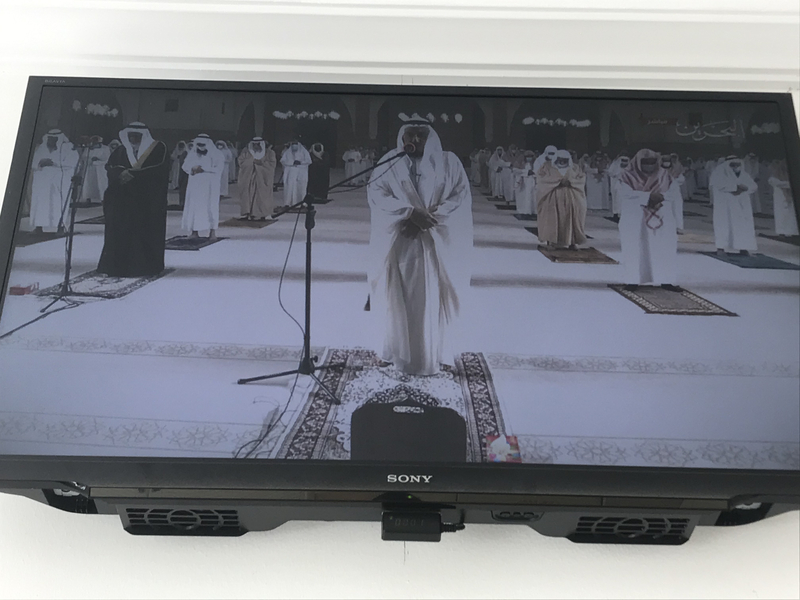Item
Covid-19 and Religious Observance
Media
Title (Dublin Core)
Covid-19 and Religious Observance
Description (Dublin Core)
Religious observance was one of the many aspects of daily life affected by the COVID-19 pandemic.
In my home country of Bahrain, congregational prayers were prohibited in mid-March, in an effort to slow the spread of the virus.
The Friday prayers were restricted to only a single mosque, Bahrain’s largest. Under normal circumstances, Muslim congregants would stand shoulder to shoulder in prayer. This was no longer the case as seen in the photo, social distancing and mask wearing was enforced.
The Islamic call prayer (the Azan) was altered, the normal line summoning the faithful to prayer “come to prayer, come to good deeds” was instead replaced with the line “pray in your homes” (as seen in the attached video, which I recorded in Bahrain on).
It was surreal hearing this for the time. The Covid-19 pandemic was the first event, at least in my lifetime, where this was done. Historically, this had precedents in times of plague.
Moreover, the Muslim Hajj pilgrimage, which draws millions to the city of Mecca in Saudi Arabia every year, was this year limited to a symbolic 1,000 pilgrims.
Having attended the Haj myself a decade earlier and been in the midst of the human masses that descend on Mecca, it was very strange to observe the images of the few socially distanced pilgrims which undertook the Hajj in late July 2020.
In my home country of Bahrain, congregational prayers were prohibited in mid-March, in an effort to slow the spread of the virus.
The Friday prayers were restricted to only a single mosque, Bahrain’s largest. Under normal circumstances, Muslim congregants would stand shoulder to shoulder in prayer. This was no longer the case as seen in the photo, social distancing and mask wearing was enforced.
The Islamic call prayer (the Azan) was altered, the normal line summoning the faithful to prayer “come to prayer, come to good deeds” was instead replaced with the line “pray in your homes” (as seen in the attached video, which I recorded in Bahrain on).
It was surreal hearing this for the time. The Covid-19 pandemic was the first event, at least in my lifetime, where this was done. Historically, this had precedents in times of plague.
Moreover, the Muslim Hajj pilgrimage, which draws millions to the city of Mecca in Saudi Arabia every year, was this year limited to a symbolic 1,000 pilgrims.
Having attended the Haj myself a decade earlier and been in the midst of the human masses that descend on Mecca, it was very strange to observe the images of the few socially distanced pilgrims which undertook the Hajj in late July 2020.
Date (Dublin Core)
Creator (Dublin Core)
Contributor (Dublin Core)
Type (Dublin Core)
Text, photographs and videos, taken by myself (except the one from Mecca, which is from the internet)
Controlled Vocabulary (Dublin Core)
Curator's Tags (Omeka Classic)
Contributor's Tags (a true folksonomy) (Friend of a Friend)
Bahrain
Religion
Prayer
Islam
Muslims
Hajj
pilgrimage
restrictions
social_distancing
masks
Collection (Dublin Core)
Date Submitted (Dublin Core)
11/08/2020
Date Modified (Dublin Core)
02/16/2021
4/9/2021
This item was submitted on November 8, 2020 by Yusuf Abdulwahab using the form “Share Your Story” on the site “A Journal of the Plague Year”: http://mail.covid-19archive.org/s/archive
Click here to view the collected data.

